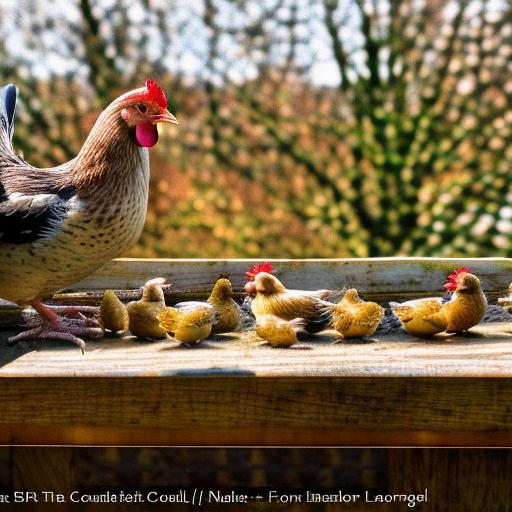Keeping chickens in a council house may seem like an unusual idea, but it is actually a growing trend in urban areas. More and more people are realizing the benefits of having their own chickens, even in the limited space of a council house. Not only do chickens provide fresh eggs, but they also make for a fun and rewarding hobby. In this article, we will explore the regulations surrounding keeping chickens in a council house, the benefits of doing so, and provide tips for setting up and caring for your chickens.
Key Takeaways
- Keeping chickens in a council house is possible with proper understanding of regulations and considerations.
- Council house regulations vary, so it’s important to research and comply with them before getting chickens.
- Benefits of keeping chickens in a council house include fresh eggs, natural pest control, and a fun hobby.
- Choosing the right chicken coop for a council house involves considering size, materials, and accessibility.
- Factors to consider when setting up a chicken coop in a council house include location, ventilation, and cleanliness.
Understanding Council House Regulations Regarding Chickens
Before embarking on the journey of keeping chickens in a council house, it is important to understand the regulations that govern this activity. Each council may have different rules and restrictions regarding the keeping of livestock, including chickens. It is crucial to follow these regulations to avoid any legal consequences.
To find out the specific regulations in your area, you can contact your local council or visit their website. They will be able to provide you with information on whether or not you are allowed to keep chickens, how many you can have, and any other requirements you need to meet. It is important to note that some councils may require you to obtain a permit or license before keeping chickens.
Benefits of Keeping Chickens in a Council House
Keeping chickens in a council house comes with numerous benefits. One of the most obvious benefits is having access to fresh eggs. There is nothing quite like collecting eggs from your own backyard and knowing exactly where they came from. Not only are fresh eggs delicious, but they are also more nutritious than store-bought eggs.
In addition to fresh eggs, keeping chickens can also be a fun and rewarding hobby. Chickens have unique personalities and can provide endless entertainment with their antics. They are also relatively low-maintenance pets, requiring only basic care and attention.
From an environmental standpoint, keeping chickens in a council house can also be beneficial. Chickens are excellent at reducing food waste, as they will happily eat kitchen scraps and leftovers. They also produce high-quality fertilizer, which can be used to nourish your garden or potted plants.
Choosing the Right Chicken Coop for Your Council House
Choosing the right chicken coop is essential when keeping chickens in a council house. The coop should not only meet the needs of your chickens but also comply with council house regulations. It is important to choose a coop that is the appropriate size for the number of chickens you plan to keep and provides adequate space for them to move around.
There are various types of chicken coops available, including traditional wooden coops, mobile coops, and even DIY options. Each type has its own pros and cons, so it is important to consider factors such as ease of cleaning, durability, and security when making your decision.
When choosing a coop for your council house, it is also important to consider the aesthetics. Some councils may have regulations regarding the appearance of chicken coops, so it is important to choose one that blends in with the surrounding environment.
Factors to Consider When Setting Up a Chicken Coop in a Council House
When setting up a chicken coop in a council house, there are several factors to consider. One of the most important factors is the location of the coop. It should be placed in an area that is well-drained and receives adequate sunlight. It should also be easily accessible for cleaning and maintenance.
The size of the coop is another important consideration. It should provide enough space for your chickens to move around comfortably and engage in natural behaviors such as scratching and dust bathing. The general rule of thumb is to allow at least 4 square feet of space per chicken inside the coop and 10 square feet per chicken in the outdoor run.
It is also important to consider your neighbors when setting up a chicken coop in a council house. Ensure that the coop is not too close to neighboring properties and that it is not causing any disturbances, such as excessive noise or odor. Being considerate of your neighbors will help maintain a positive relationship and avoid any potential conflicts.
Feeding and Caring for Your Chickens in a Council House

Feeding and caring for your chickens in a council house is relatively straightforward. Chickens require a balanced diet consisting of commercial chicken feed, fresh water, and occasional treats. It is important to provide them with a high-quality feed that meets their nutritional needs.
In addition to their regular feed, chickens also enjoy kitchen scraps and leftovers. However, it is important to avoid feeding them anything that may be harmful or toxic, such as chocolate, onions, or avocado. It is also important to provide them with fresh water at all times.
Caring for chickens also involves regular cleaning of the coop and nesting boxes. This helps maintain a clean and healthy environment for your chickens and reduces the risk of disease. It is also important to regularly check for signs of illness or injury and seek veterinary care if necessary.
There are numerous resources available online and in books that provide detailed information on feeding and caring for chickens. It is recommended to do some research and educate yourself on the best practices for chicken care.
Dealing with Noise and Odor Issues When Keeping Chickens in a Council House
One concern that may arise when keeping chickens in a council house is the potential for noise and odor issues. Chickens can be noisy, especially when they are laying eggs or feeling threatened. However, there are steps you can take to minimize noise disturbances.
Keeping the coop clean is one way to reduce odor issues. Regularly cleaning out the coop and replacing bedding material will help keep odors at bay. Additionally, using odor-reducing products such as pine shavings or straw can help absorb any unpleasant smells.
It is also important to be considerate of your neighbors when keeping chickens in a council house. Let them know about your plans to keep chickens and address any concerns they may have. Being open and communicative can help maintain a positive relationship and prevent any potential conflicts.
Keeping Your Chickens Safe from Predators in a Council House
Keeping your chickens safe from predators is crucial when keeping chickens in a council house. Even in urban areas, there are potential predators that can threaten your chickens, such as foxes, raccoons, and neighborhood cats.
To protect your chickens, it is important to use secure fencing around the coop and run area. This will help prevent predators from gaining access to your chickens. Additionally, it is important to lock the coop at night to keep your chickens safe from nocturnal predators.
Being vigilant and proactive in protecting your chickens is key. Regularly inspect the coop for any signs of damage or weakness that could allow predators to enter. It is also important to be aware of any potential threats in the area and take appropriate measures to deter them.
Legal Consequences of Violating Council House Regulations for Keeping Chickens
Violating council house regulations for keeping chickens can have legal consequences. Depending on the specific regulations in your area, you may face fines or other penalties for non-compliance. It is important to follow the regulations and obtain any necessary permits or licenses to avoid these consequences.
To ensure compliance, it is recommended to familiarize yourself with the specific regulations in your area. Contact your local council or visit their website for information on the rules and requirements for keeping chickens in a council house.
Enjoying the Rewards of Keeping Chickens in a Council House
Keeping chickens in a council house can be a rewarding experience. Not only do you get to enjoy fresh eggs and a fun hobby, but you also contribute to reducing food waste and providing natural fertilizer. By following council house regulations and being considerate of your neighbors, you can enjoy all the benefits that come with keeping chickens in an urban setting. So why not consider adding some feathered friends to your council house?
If you’re wondering about the practicalities of keeping chickens in a council house, you may also be interested in learning more about creating a suitable environment for your feathered friends. Check out this informative article on Poultry Wizard that discusses the importance of having a heater for a chicken coop. It provides valuable insights on how to keep your chickens warm and comfortable during colder months. Click here to read more: https://poultrywizard.com/keeping-chickens/heater-for-a-chicken-coop/. Additionally, if you’re considering converting a shed into a chicken coop, this article on Poultry Wizard offers practical tips and guidance. Discover how to transform your shed into a safe and functional space for your chickens: https://poultrywizard.com/keeping-chickens/convert-shed-to-chicken-coop/.
FAQs
What is a council house?
A council house is a type of social housing provided by local government authorities in the United Kingdom. These houses are rented out to people who are in need of affordable housing.
Can you keep chickens in a council house?
Yes, you can keep chickens in a council house, but you need to get permission from your local council first. The rules and regulations regarding keeping chickens may vary from council to council, so it’s important to check with your local authority before getting chickens.
What are the rules for keeping chickens in a council house?
The rules for keeping chickens in a council house may vary depending on the local council. However, some common rules include:
- You may need to obtain a license or permit to keep chickens
- You may be limited to a certain number of chickens
- You may need to keep the chickens in a secure coop or run
- You may need to keep the chickens clean and well-maintained
- You may need to ensure that the chickens do not cause a nuisance to your neighbors
What are the benefits of keeping chickens in a council house?
Keeping chickens in a council house can have several benefits, including:
- Providing a source of fresh eggs
- Reducing food waste by allowing chickens to eat kitchen scraps
- Providing natural pest control for your garden
- Teaching children about responsibility and animal care
What are the potential drawbacks of keeping chickens in a council house?
Some potential drawbacks of keeping chickens in a council house include:
- The cost of setting up and maintaining a chicken coop and run
- The time and effort required to care for the chickens
- The risk of noise and odor complaints from neighbors
- The risk of attracting pests such as rats and mice
Meet Walter, the feathered-friend fanatic of Florida! Nestled in the sunshine state, Walter struts through life with his feathered companions, clucking his way to happiness. With a coop that’s fancier than a five-star hotel, he’s the Don Juan of the chicken world. When he’s not teaching his hens to do the cha-cha, you’ll find him in a heated debate with his prized rooster, Sir Clucks-a-Lot. Walter’s poultry passion is no yolk; he’s the sunny-side-up guy you never knew you needed in your flock of friends!







